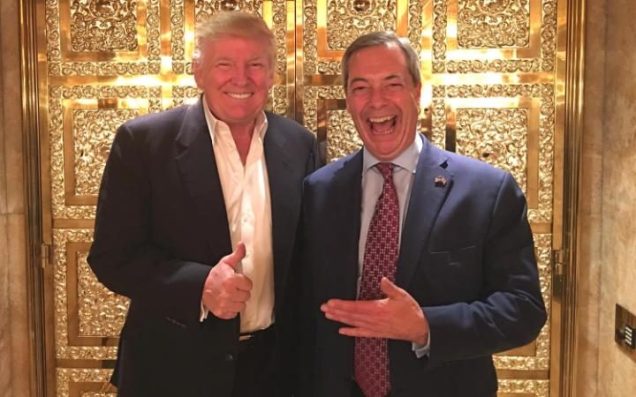
–
America’s new president-elect is bad, but he is hardly evil on a world-historical scale. Unfortunately, the hysterical media reaction to Donald Trump’s election victory leaves no room for nuance or restraint
In these fractious times, it is very difficult for those of us who fall into the “really didn’t want Donald Trump to win, but don’t consider his victory to be quite the end of civilisation” crowd to say anything, for fear of reprisal – not from Donald Trump supporters, but from certain anti-Trump activists who have taken to using a person’s level of anger at the election result as an indicator of their personal moral code or worth.
Since Trump’s unexpected victory, the strong message being transmitted by much of the left-wing post-election commentary has been that if you aren’t rending your garments, taking to the streets with burning torches, retreating to a safe space or dissolving into tears every five minutes then you must be a closeted Donald Trump supporter.
Look: I really really did not want Donald Trump to be the next president of the United States. This blog has been pretty clear about my estimation of Donald Trump and the low regard in which I hold the president-elect. But not every charge flung at Donald Trump by left-wing partisans deserves to stick, because some of them are major overreaches prompted by partisan fervour rather than objective accuracy. And it should be possible to point out where criticism of Donald Trump goes too far, or is flat-out wrong, without being accused of supporting the man himself.
It does nobody any good if this election causes America to fracture into three distinct factions: unapologetic pro-Trump supporters, furious anti-Trump activists and a group of pragmatists who want to make the best of a difficult situation but who have been cowed into sullen silence for failing to pick a side and express either blanket admiration or total hatred for Donald Trump. If the country is to knit back together, it is this final group which must act as the cords which bind the nation’s wounds and bridge mutual suspicion. Assailing people for neither hero-worshipping Trump nor treating him like Hitler really is not the smartest thing to do in terms of improving the toxic atmosphere in American politics.
I’m told that I cannot possibly understand what it is like to be black, disabled, Mexican, female, gay or transgender in Trump’s America. Well, okay. But I did grow up mixed race in 1990s Britain, when not everybody was super friendly toward people who are not white. Sure, I never had to fear being gunned down in the street by a policeman for walking or driving suspiciously, but as a child I have been shoved and called all the worst racial epithets one can think of. I didn’t let it scar me for life and as I’ve grown older I can probably count the total number of verbally or physically hostile interactions over the past decade on two hands, but I certainly don’t have the dreaded “white privilege”. Yet while I certainly do not look forward to Donald Trump’s presidency, I do not fear it in a physical sense.
Donald Trump is objectionable for all of the reasons that the mainstream media has (belatedly) gotten around to pointing out. He is vulgar and thin-skinned, and in a confrontational situation he will use any defining characteristic to taunt or belittle an opponent. If you are fat, Trump will harp on about how massive you are. If you are not conventionally attractive, Trump will be sure to point that fact out to everyone. And most distastefully, he will apparently do the same if you are disabled. Donald Trump is not a nice person.
But there is vast gulf between being personally repellent and representing an active physical danger to the very same people that Trump insults on Twitter, in television interviews or on stage at his rallies. And we need to recognise that fact. It should be possible to abhor Donald Trump’s mockery of a disabled journalist without making the leap of imagination that a Trump presidency will somehow lead to the state-sanctioned persecution of disabled people. It should be possible to oppose Donald Trump’s most ignorant or insulting rhetoric about racial minorities without imagining World War 2 era Japanese internment camps for black people and lawful, legal immigrants.
The point is this: if we go nuclear in every single criticism of Donald Trump, we have nowhere left to go when somebody with truly severely racist or homophobic views comes along. It is important to leave some slack in our language so that we have room left to describe true evil when it crosses our path. If we wear out our strongest warnings and our most alarmist rhetoric on somebody who has a foul mouth but no evident plans to single out American citizens for persecution, what do we do if one day there is a presidential candidate who actively refuses to associate with black, Hispanic, gay or trans people and who runs on an unabashedly Jim Crow platform?
(Furthermore, I feel compelled to note that right now it is the Social Justice, Identity Politics Left which is clamouring to bring back racial and gender segregation, and not the conventional or alt-right).
Even as I write this, I can feel some people becoming outraged and accusing me of being a Trump apologist. But Trump is terrible! Yes, he is really bad. But the momentary catharsis of accusing Donald Trump of every prejudice and evil under the sun, whether each one is deserved or not, is really not worth the additional damage which going nuclear is doing to our political discourse. At some point it might be nice to persuade some of those who voted for Donald Trump in 2016 to vote for somebody else in 2020. It will be much easier to engage them in dialogue if we have not first accused them of being latter-day Nazi collaborators.
If it sounds like I am rather treading on eggshells in this piece, it is because I am. Trump’s election victory has divided America, divided the world, divided families. And maybe two weeks after the election is too soon to expect the blood to have cooled and objectivity to reign. So while I struggle to put into words what I am trying to say, I encourage everybody to read this piece by Scott Alexander of the SlateStarCodex blog, who offers some excellent perspective and advice.
(Hat tip to Brendan O’Neill for bringing the piece to my attention on Facebook).
It’s a long piece of analysis, but I will quote the conclusion, which should be required reading for everyone in America (and anyone else moved to write about American politics):
Stop fearmongering. Somewhere in America, there are still like three or four people who believe the media, and those people are cowering in their houses waiting for the death squads.
Stop crying wolf. God forbid, one day we might have somebody who doesn’t give speeches about how diversity makes this country great and how he wants to fight for minorities, who doesn’t pose holding a rainbow flag and state that he proudly supports transgender people, who doesn’t outperform his party among minority voters, who wasn’t the leader of the Salute to Israel Parade, and who doesn’t offer minorities major cabinet positions. And we won’t be able to call that guy an “openly white supremacist Nazi homophobe”, because we already wasted all those terms this year.
Stop talking about dog whistles. The kabbalistic similarities between “dog-whistling” and “wolf-crying” are too obvious to ignore.
Stop writing articles breathlessly following everything the KKK says. Stop writing several times more articles about the KKK than there are actual Klansmen. Remember that thing where Trump started out as a random joke, and then the media covered him way more than any other candidate because he was so outrageous, and gave him what was essentially free advertising, and then he became President-elect of the United States? Is the lesson you learned from this experience that you need 24-7 coverage of the Ku Klux Klan?
[..] Stop turning everything into identity politics. The only thing the media has been able to do for the last five years is shout “IDENTITY POLITICS IDENTITY POLITICS IDENTITY POLITICS IDENTITY POLITICS IDENTITY POLITICS!” at everything, and then when the right wing finally says “Um, i…den-tity….poli-tics?” you freak out and figure that the only way they could have possibly learned that phrase is from the KKK.
Stop calling Trump voters racist. A metaphor: we have freedom of speech not because all speech is good, but because the temptation to ban speech is so great that, unless given a blanket prohibition, it would slide into universal censorship of any unpopular opinion. Likewise, I would recommend you stop calling Trump voters racist – not because none of them are, but because as soon as you give yourself that opportunity, it’s a slippery slope down to “anyone who disagrees with me on anything does so entirely out of raw seething hatred, and my entire outgroup is secret members of the KKK and so I am justified in considering them worthless human trash”. I’m not saying you’re teetering on the edge of that slope. I’m saying you’re way at the bottom, covered by dozens of feet of fallen rocks and snow. Also, I hear that accusing people of racism constantly for no reason is the best way to get them to vote for your candidate next time around. Assuming there is a next time.
My emphasis in bold. Scott Alexander concludes with this plea:
Stop centering criticism of Donald Trump around this sort of stuff, and switch to literally anything else. Here is an incompetent thin-skinned ignorant boorish fraudulent omnihypocritical demagogue with no idea how to run a country, whose philosophy of governance basically boils down to “I’m going to win and not lose, details to be filled in later”, and all you can do is repeat, again and again, how he seems popular among weird Internet teenagers who post frog memes.
In the middle of an emotionally incontinent reality TV show host getting his hand on the nuclear button, your chief complaint is that in the middle of a few dozen denunciations of the KKK, he once delayed denouncing the KKK for an entire 24 hours before going back to denouncing it again. When a guy who says outright that he won’t respect elections unless he wins them does, somehow, win an election, the headlines are how he once said he didn’t like globalists which means he must be anti-Semitic.
Stop making people suicidal. Stop telling people they’re going to be killed. Stop terrifying children. Stop giving racism free advertising. Stop trying to convince Americans that all the other Americans hate them. Stop. Stop. Stop.
I have no desire to denigrate the fear and pain of anybody who is in genuine fear following Trump’s election victory. I do not take perverse joy from laughing at the terror and misery of other people. But it is my contention that much of this fear has been manufactured by various people and for various reasons – some vaguely noble, others much less so.
Frequently we hear the refrain that various identity groups “no longer feel welcome in America”. Would that include gay people, whom President Barack Obama did not consider worthy of the institution of marriage until changing public opinion (and a big helping hand from Joe Biden) caused him to shift position? Would that include illegal immigrants, whom Hillary Clinton voted to thwart with a border fence and Barack Obama deported in record numbers? Would that include black people, whom the sainted Hillary Clinton once described as “super-predators“?
Once the excitement of the election has properly died down we urgently need to separate the things which are actually concerning about Donald Trump from the frivolous dangers which exist mostly in people’s minds.
Much is (belatedly) being written about how the media failed to do a good job covering Donald Trump’s presidential candidacy in the early months. Quite right too – they chased ratings, broadcast voyeuristically lingering live coverage of his meandering speeches for entertainment rather than educational value and failed to ask tough questions or do proper investigative journalism until way too late in the process.
But the media is failing now in a different way, having overcompensated for past sins by now reporting any hysterical fear about Donald Trump, no matter how absurd or far-fetched, as though it is inherently legitimate and worthy of consideration. Take this hypersensitivity to Donald Trump’s boorish rhetoric coupled with an infantilised population who sometimes seem to prefer to act like helpless babes rather than autonomous and resilient adults, and the result is not pretty. In fact, it is downright ugly.
I am very aware that this blog post is not up to the usual standard – it probably does not “flow” as it should, and is much more a stream of consciousness than anything else. But the bottom line is this: there will be enough work to do scrutinising the Trump administration and keeping its worst excesses at bay for the next few years without also turning on each other, fellow people who opposed Trump’s candidacy.
This post will likely see me damned by those who are fully on board the Trump train as well as those implacably opposed to Donald Trump (as I was) and determined to see only evil in everything that occurs until he departs the scene. So be it. I find it very strange to be in the position of the “moderate middle” for once – somewhere I never find myself when it comes to British politics – but there we are.
I knew there was a reason why I named this blog Semi-Partisan Politics.

–
Support Semi-Partisan Politics with a one-time or recurring donation:

–
Agree with this article? Violently disagree? Scroll down to leave a comment.
Follow Semi-Partisan Politics on Twitter, Facebook and Medium.







